Novum Romanum Imperium -- A Tuscany DW AAR
- Thread starter Avindian
- Start date
-
We have updated our Community Code of Conduct. Please read through the new rules for the forum that are an integral part of Paradox Interactive’s User Agreement.
You are using an out of date browser. It may not display this or other websites correctly.
You should upgrade or use an alternative browser.
You should upgrade or use an alternative browser.
Feedback
loki100 -- Believe me, the Pope will get his!
cosmeIII -- That's the idea -- the tricky part may be that Milan has no way to get to Siena and Pisa, and I don't think it will access for MA (it never has in my test games). Nonetheless, this is an opportunity I do not intend to pass up.
chals -- And Tuscany is a little small for an Empire
Ivir -- I fixed this in the most recent update, but thanks for catching that! My Latin's a bit rusty after years of non-use, forgot the "n" only appears in the plural.
I think the sienese should quickly disband their army.
They don't, but I do disband it for them
This next update will be short in years but long in action; I'll work on it tonight, at least a little, and could finish it as soon as tomorrow afternoon or evening.
Chapter 2: A great victory and a great loss
7 June 1406, the Imperial throne room
Emperor Maso I, normally not a very patient man, was practically at wit's end pacing his throne room back and forth. He belonged in the field, not trapped in his gilded cage, but until preparations were complete, he could not act. Even his son, his pride and joy, offered little solace -- he was hungry to prove that he had not been a fool to establish an Empire in Tuscany. When the herald announced the arrival of Consul Marcus Porcius Cato, it was all he could to do to not immediately bolt for the doors and rip them open himself.
Knowing of his Emperor's impatience, Consul Cato exchanged only the briefest of pleasantries before he got straight to his duties. "Your Imperial Majesty, my mission has been a success! A local mercenary captain was only too happy to provide 1000 men for 15 ducats; they will be ready in a fortnight and will await you in camp with the Emperor's Legion. I am told they are quite good in battle, having fought many a campaign all over Europe, from the Ottoman Empire to a brief stay in Scotland, under the direction of the King of France."
The Emperor let out an audible sigh of relief. He had hoped for these particular mercenaries exactly because of their reputation as fierce fighters. "And the paintings? Did you find a suitable artist?"
Consul Cato, who had always been confused by this request, nonetheless replied "Yes, Emperor, I handpicked five different artists and sent your loyal Magistrates to convince them. The paintings are already completed; it seems that the artists were already inspired by your person and had self-portraits ready-made for you. I must confess, Your Imperial Majesty, I still have no idea why you were so eager."
The Emperor smiled. "For simple men such as us" -- at this remark Cato nearly choked on his wine, but discreetly covered his mouth with a napkin -- "such luxury may seem too extravagant. However, the best and brightest minds are only drawn by Cultural Tradition. I am hopeful we can hire a talented local Sheriff to improve our tax collecting."
Cato gave a smile of his own, for he had been considering such a move himself. "You will be well pleased, then. I had not connected the two, but a local Sheriff -- Salvestro Butteri -- actually came to me before I left, saying how impressed he was with your recent commitment to culture, and offered his services exclusively to the Empire of Tuscany! I would judge him a 3 out of 6 stars, based on his credentials."
The Emperor's smile changed to a frown. "Stars? Astrae? What kind of rating system is that? And why would we only get an inferior leader?"
Cato paused for just a moment, thought, and came up with a response he was sure the Emperor would accept. "Well, my Emperor, you see, the bureaucrats are obsessed with counting things, yet? They decided that only the lights of Heaven itself could possibly explain how skilled they were in such matters, and pretty soon advisers all over the world were using this ridiculous scale. Perhaps it is best to humor them, yes?"
The Emperor took a moment to consider, then burst out laughing, the first he had had in some days. "Hah hah hah! You certainly know bureaucrats, my good friend!"
Cato, inwardly thankful, joined in the laughing, until the Emperor stopped. Then, the Consul continued. "Europe has not yet recognized our greatness, Emperor Maso, although why I cannot say. They are too old to truly appreciate the dynamism of the Tuscan Empire, and for now, it is perhaps wise to humor them as well, just as the bureaucrats."
The Emperor nodded grimly, and instructed Cato to prepare a room for his new adviser -- he wasn't ready to hire the Sheriff yet, as he wanted to determine how expensive his new plan would be. He then sent a message to the new mercenary captain, offering him even greater riches for another regiment of his best men. Europe being quiet at the moment, he knew the captain could not resist.
-----------------------------------------------------------------------------------------------
4 July 1406, the camp of Legio I 'Imperator'
The Emperor had come to like the mercenary captain. Seeing the grizzled veteran moments after arrival, the Emperor quickly began calling him Senex, or "Old Man." The name stuck, mostly because the captain didn't care what he was called so long as he was paid on time and in full. They were sharing some old war stories, or more appropriately, Captain Senex was telling and the Emperor was listening. The Captain's men had gotten tired of his stories, but to the Emperor, who had not grown up around war, they were fresh and exciting. Out of the corner of his eye, the Emperor caught sight of a nervous looking young man from the palace at Florence. He motioned the youngster over.
"My son, what is it? Do not shiver so, it is warm by the fire."
The young man stuttered, finally remembered to salute, then just as quickly pulled it down, as only soldiers were to salute. Less kindly now, the Emperor sternly gestured for him to sit. "Answer me now, lad, or you will join the Captain and his men very quickly. It is much easier to practice swordplay with a partner, I am told, and even better when they are expendable." The young man nodded, trembling, and sat.
"Er... my Emperor... Siena's war with Milan has greatly expanded. Milan called in Burgundy and Venice, while Venice called in her vassals. My father -- an innkeeper in town -- got this from a Milanese officer, who also suggested it would be a matter of days before troops landed in Siena."
The Emperor, outraged, smacked the boy so hard that he went end over end and into the fire. The boy, weeping in pain, ran as fast as he could to a nearby creek and threw himself in. The Emperor swore, hastily grabbed a quill and parchment, and quickly wrote two dispatches, one for the palace in Florence and one for the Doge of Siena.
-------------------------------------------------------------------------
The one to Florence read:
Honored Consul Marcus Porcius Cato,
Instead of funding research projects, please divert all new revenues to minting for the Imperial treasury. We will soon be at war with Siena. The Swede may object strenuously to the increase in inflation; assure him it will just mean more work for him and a possible salary increase if he can fit it into the budget.
Emperor Maso I
The one to Siena read:
Doge Pandolfo Zeti,
I am writing to inform you that, should you fail to return Tuscany's ancestral lands in Pisa, we will have no choice but to meet you on the battlefield. You have twelve hours from the receipt of this message to comply.
Maso I, Emperor of the Glorious and Righteous Empire of Tuscany
-------------------------------------------------------------------------------------------Both riders galloped in a frenzy, one north to Florence and the other west to Siena. The rider from Florence arrived a few hours later, with a curt acknowledgement from Cato and wishes for success in the coming Campaign. The response from Siena was more macabre -- the rider's horse had returned, with the word numquam! [never!] written in blood on the decapitated body of the rider. Siena and Tuscany were at war!
---------------------------------------------------------------------------------------------
31 August 1406, the Imperial Throne Room
Consul Cato picked up the latest bundle of letters, and per his usual habits, went immediately to the last one in the bundle, dated only the previous day, and addressed by the Emperor himself.
Honored Cato, Imperial Consul --
I am writing to warn you of an incoming army -- I can only pray this arrives before the enemy army does. The great Battle of Firenze has been a strategic victory for our glorious soldiers, but a tactical defeat. The Sienese have a skilled general, Fortunato Palumbo, who has trained his archers so well they can strike even before we raise our shields! [1] We inflicted serious casualties upon him -- over 2,000 compared to just 500 for our brave men, most of whom were probably mercenaries, but were forced to withdraw. He may be laying siege now. If you have time, I beg of you, ring the alarm bells and burn what cannot be salvaged from the fields; the enemy must not be succored on the fruits of Tuscan labor!
The Emperor
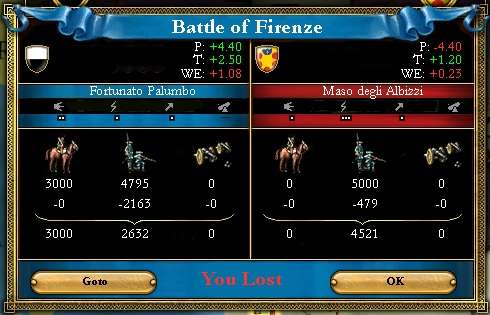
Unfortunately, Cato did not have time to carry out his orders; just as he set down the letter, he saw a huge column of Sienese troops, who were already encircling the castle and slaughtering peasants. He ran the alarm bells, but feared he was too late. [2]
----------------------------------------------------------------------------------------------
3 September 1406, a field in the Romagna
The Emperor was furious. The mercenary captain, well practiced in war, had even outdone him in diplomacy! Without thinking, in the heat of battle, Captain Senex sent a Tuscan rider to a contact he had in the Vatican, requesting quarter and shelter for his troops. Fuming, the Emperor himself sent a second request, also requesting quarter, for the Legio I 'Imperator.' Both requests were honored (surprisingly, thought the Emperor -- perhaps the old Pope was going senile?), and they had set up camp in the bountiful fields in the Papal territory of Romagna.
The Captain and his lieutenants were discussing their best course of action. Seeing a chance to prove his military skill, the Emperor inserted himself into the conversation and demanded an immediate relief effort of the Imperial city. Senex took one look at his second-in-command, then both started laughing so loudly an entire flock of nearby ravens took flight and sought less noisy surroundings. The Emperor, by now, was nearly beside himself and about to order the execution of the Captain, when the Captain, realizing his mistake, explained himself.
"My Emperor, a frontal assault on the hills of Florence would be suicide. I believe this would be the best strategy," he said, rolling out a map.
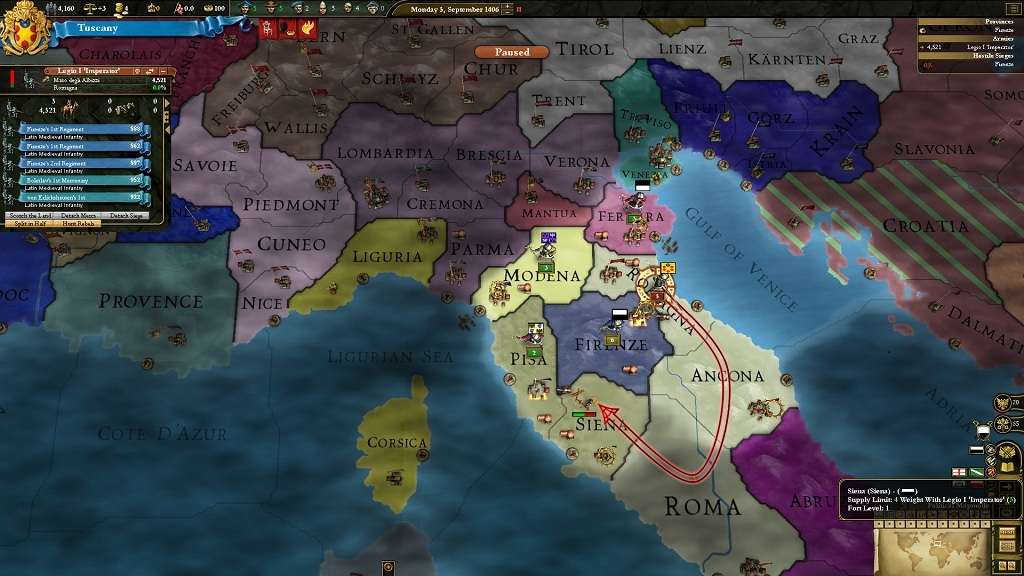
"We already know that the Milanese have landed troops in Pisa. There will likely be more to come. Therefore, we should attack Siena and take it as quickly as possible. I have contacts in Pisa -- I may even be able to gather more soldiers if you can pay them as well as you have paid me and my boys."
The Emperor, at first nearly apoplectic with rage, immediately calmed down and saw the sense of the matter. "You know, my Captain, you're right! I knew I hired you for a reason! Even if the city surrenders, the Sienese army has nowhere to go -- they can either attack the Milanese column -- so much the better for us -- or they will have to attack us, now well entrenched and with potentially superior numbers. A brilliant plan! I shall see to it you are richly rewarded!"
-----------------------------------------------------------------------------------------------
14 November 1406, the Imperial camp outside the city of Siena
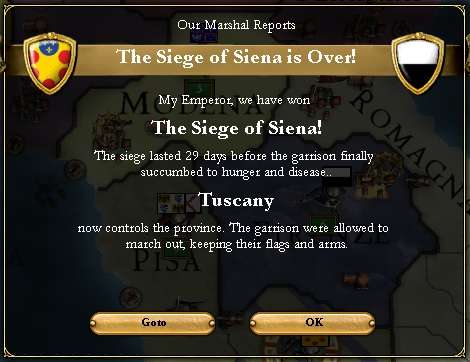
The sentry, a newly promoted corporal [3], immediately challenged the cloaked figure, but did not get the response he had hoped.
"Password, you idiot? You don't recognize your own father?!"
Corporal Marcus Porcius Cato Minor stared, stunned, into the eyes of the Imperial Consul, Marcus Porcius Cato Major. "Father! With that cloak, even mother could not recognize you!"
Cato the Consul held his stern look for just a moment, wavered, and finally beamed with pride at his son, Cato the Corporal. "Congratulations on the promotion, my son. I had heard you served with distinction at the side of the Emperor during the Battle of Firenze, even saving his life!"
Cato the Younger blushed, then quickly realized why his father was there. "Thank you, Father! I expect you are here to see the Emperor; he is inside the tent over there."
Cato the Elder solemnly nodded, saluted, and bubbling with joy, marched to the tent, where he informed the guard of his presence.
The Emperor, busily planning the defense of Pisa, broke out into a huge smile when he saw Cato had arrived. "Cato, my friend! It has been too long. I trust your journey went well?"
The Consul nodded vigorously, but added, "I must say, some of your corporals are a bit overzealous in their duty." The Emperor's expression darkened a bit, but quickly brightened when Cato the Elder assured him that the corporal in question was his son. The Emperor chuckled.
"You know, your son may be due for another promotion, if he keeps up his performance for the remainder of this war. I have been looking to interest my son in the military, and Cato the Younger would be a superb instructor and tutor; he has learned much from the mercenary Captain and has already started studying treatises on war quite feverishly. I would not be surprised to see him become a General when all is said and done!"
Now it was Cato the Elder's turn to blush furiously. The Emperor then asked, "And how are my people? Did everybody escape to the Papal palace through the tunnels under the castle." When Cato's countenance immediately dropped, the Emperor knew the news could not be good.
"Your Imperial Majesty, many of your people escaped, but one of the best did not. Already wounded from fighting on the walls, Marcus Agrippa attacked an enormous Sienese soldier, who had cast his eyes on your beloved son, perhaps thinking to ransom him for an enormous sum. With his final breath, Agrippa grabbed his sword and slew the soldier where he stood, giving a garrison soldier the time to collect your son and take him to the tunnels. I found this note on his person -- from the shaky handwriting, I'd say it might have been written just before he encountered the soldier." He handed the note to his Emperor, who began reading with tears in his eyes, and by the end, he openly wept.
Dearest Maso,
Since I will not have time to address you in person, I hope you will forgive me just this once for using your Christian name. I have made many mistakes in my time, the worst of which was betraying your trust and the trust of the people of Tuscany. I have, without question and without complaint, taken the punishment I so richly deserved as a traitor to my oldest and best friend. Perhaps it is these last few moments of my life that have caused me to rethink my actions; perhaps it is just repentance for my sins, in that I might selfishly find my place in Heaven. With the news I have heard of your recent triumph, I know that I was mistaken to challenge you; I have never been so happy to have been so wrong.
I remain in death as I was in life, your devoted friend, if not a devoted servant,
Marcus Vispanius Agrippa
The Emperor dried his eyes as best he could. He and Cato drank in remembrance of their fallen friend and shared some fond memories. Collecting himself, the Emperor turned to business.
"My dear Cato, thank you for keeping this note safe in your perilous journeys. You are the only true friend I have left, and I am honored at your exemplary service. I trust your wife made it to safety?"
Cato momentarily brightened, nodded, and then asked for news of the war.
In response, the Emperor took Cato to see the soldiers train. Cato had never seen such crisp movements by any army ever, and it seemed to keep the soldiers busy and happy, improving morale.

Smiling slightly at Cato's awe, the Emperor explained: "This is called Military Drill; it is a new method of training that I am sure will catch on; it will help us be better prepared for our next battle against the Army of Siena. I sent a messenger to sue for peace. I heard that the Doge listened to him, respectfully, but declined. This is a great change in attitude. I feel that victory is within our grasp, and the sacrifices of our friends and family shall not be in vain!"
----------------------------------------------------------------------------------------------
10 March 1407, a chamber set aside for the business of the Empire by the Pope in Rome
Cato, Consul of Tuscany, called a meeting among the advisers of the Empire. Some momentous decisions needed to be made, and Cato dared not take them on his own, without at least consulting some of the brightest minds in all of Europe.
"Gentlemen, thank you all for coming so swiftly. Our Emperor has instructed me to update everybody on his activities in our glorious war against the hated Sienese and their damned Doge. With some of the Imperial treasury, he has hired an additional regiment of mercenaries; he would prefer to hire another two more. He has already taken out a loan using his personal collateral -- a jeweled sword that has been a family heirloom for hundreds of years. With his blessing, I have officially hired the young man many of you have seen around these rooms, Sheriff Salvestro Butteri. Signore Butteri has promised to increase our tax revenues by 3%, a considerable sum, but we need to do more. I am asking all of you to provide collateral to help us gain more revenue; there are banks here in Roma who would happily provide us with the extra currency, but require extensive collateral to do so."
All at the table at once nodded, and sent their servants to procure the necessary items.
"Thank you all, my friends. Truly the Empire of Tuscany is blessed to have such powerful and kind benefactors. I also wanted to inform you of His Imperial Majesty's campaign strategy. He has attempted to convince the Milanese and Burgundians to assault the fortress at Pisa, but they refuse to move. Their time shall come later, but for now, we must consider other alternatives. The Emperor has already received multiple peace treaty proposals, but none acknowledge our ancestral right to the lands of Pisa. We must press on; I know many of you are worried about friends, family, and property still in Tuscany. We must, for the moment, steel ourselves and focus on the task at hand -- supporting our Emperor and doing what it takes to ensure our children, and their children, have a glorious Empire, and that someday, our namesakes will look down on us with pride!"
The meeting ended with a raucous cheer; no setbacks would ever break the spirit of Tuscany!
------------------------------------------------------------------------------------------------
24 March 1407, the Legionary Camp at Siena
The Emperor seemed to ignore the screams of the man less than fifty feet away. Well he would, too, for he was a traitor to Tuscany and deserved worse. An unsavory member of Captain Senex's company seemed to have a talent for the disturbing art of torture. The Emperor could not afford to have feelings, not as he had to ask greater sacrifices of the Tuscan people.
To the people of Tuscany --
I, your most humble Emperor, begs your forgiveness in this time of crisis. A dastardly and hateful traitor to your Emperor and your country, instead of delivering your hard earned money to the infantry captains of Siena, all of whom were ready to swear allegiance to the people of the Tuscan Empire, instead stole the money and tried to leave the country! Our sentries caught him, but not before he had already spent the money on a new horse. Well, our soldiers have eaten his horse and he will not leave here alive! [4]
Because of his crimes, you, my beloved people, must give a little more, for the glory of Tuscany. I must increase all taxes by 50% -- this War Tax will end as soon as hostilities do, which I pray will end every day.
I thank you from the bottom of my heart for your sacrifices; I promise you all that when our ancestral homes are returned, you will all enjoy the bounty of the Earth as you never have before!
Emperor Maso I
----------------------------------------------------------------------------------------------3 May 1407, the Tuscan Government Hall in Rome
A rare sight in those troubled times, the Emperor himself arrived at the new building officially designated for Tuscan Government activities. With the economy in tatters, the Emperor knew his request would be extremely unpopular, but he needed to, quite literally, buy just a little more time. Ironically enough, Florence had held out much longer than he thought; until they felt themselves secure, the Sienese army would never march, either on Siena or Pisa.
When the Emperor met Cato the Elder outside the main council room, he could hear tremendous shouting and weeping from inside. Before the Emperor could enter the hall, Cato blocked the doorway. "My Emperor, I would advise against that. You are the most hated man in all of Italy right now; you have nearly bankrupted your people. While I understand and fully support your decision, many others do not. I have secured one final loan for you to pay your men and continue operations. I dare not tell you the collateral -- only that I pray you can pay the loan off before it is due. We will have to declare bankruptcy on 30 June 1407; you must end the war before then or your soldiers will disappear and we will lose everything. There are no more loans to be had; even the most unscrupulous lenders consider us a bad risk to repay our debts. Let us both pray that you are victorious; pray to any and all gods you can, My Emperor. We can use all the help we can get."
The Emperor nodded. Perhaps he would consult the new Pope; Innocentius VII, on the Papal Throne for a few weeks, seemed much more reasonable than his predecessor. In fact, he had been the one to recommend to Innocentius VI that the halls of Rome should be open to Tuscany's people. Perhaps this Pope would recognize the glory that he could join as part of the Tuscan Empire!
----------------------------------------------------------------------------------------------
16 May 1407, outside the camp at Siena
Words do not exist to describe the Emperor's pure and unbridled hatred for Siena. Were it not for his people's desperate situation, he would insist on wiping Siena from the Earth. He hurled the latest dispatch he had received at the ground, while he thought of an appropriate response.
Dear Emperor Masino, [5]
It is obvious you are a coward and care nothing for your people. Your city fell 11 days ago, yet you have not once done the honorable thing and surrendered your army! Because I am a better man than you, I will offer you terms. I will require your entire Imperial Treasury to pay for the damage you have done, I am sure, to our beautiful towns and cities. You will break all of your agreements with the Pope and Naples, as you are not worthy of being their friend. And finally, you will agree to become my vassal, so that you may lick my boots when I am done in the woods! I await the time and place of your surrender; even a moron like you deserves some courtesy.
Your superior,
The Doge of Siena
The Doge of Siena
The Emperor needed to make the right statement. A nasty smile crossed his face. "Captain, we have the rider who delivered this message, do we not?"
The mercenary captain nodded. "Yes, your Emperor. He gave his name as Zeti; I did not catch his first name."
The Emperor's evil smile grew even wider. "Excellent! Bring him to me; I wish to practice my swordplay on a useless piece of meat."
Upon receiving the dismembered and beheaded corpse of his younger brother, some said the Doge could be heard for hundreds of miles; the Emperor's one word message had been clearly received.
Numquam.
----------------------------------------------------------------------------------------------
7 June 1407
It had been a very hard battle; for two weeks, the Emperor of Tuscany had led his men personally into battle. Siena was flat, unlike Tuscany -- the Sienese cavalry were slaughtering even the most well trained infantry. At this stage, fighting was hand to hand -- he could barely stand, every muscle aching, yet on the other hand, he felt nearly invincible and full of energy, despite almost no sleep for two straight weeks.
As he lifted his sword to kill another enemy soldier, he heard a trumpet blast. Then another, then another! When he screamed at the top of lungs, asking what happened, he only got two words as a response, "THEY'RE RUNNING!!!! THEY'RE RUNNING!"
A cheer sprang up from the throats of each and every man; although surrounded by hundreds of dead Tuscan men, there were plenty of Sienese soldiers as well. However, there could be no celebration -- this was a unique opportunity. The Emperor ordered that camp be broken for the first time in months; it was time to take the fight to the enemy.
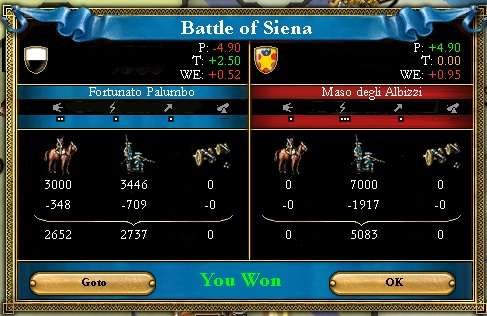
----------------------------------------------------------------------------------------------
23 June 1407, the Imperial Throne Room in Tuscany
It was all over! For a war of nearly a year, there were only three battles. The second battle of Firenze lasted only a day; the entire army surrendered, as they knew there was no escape.
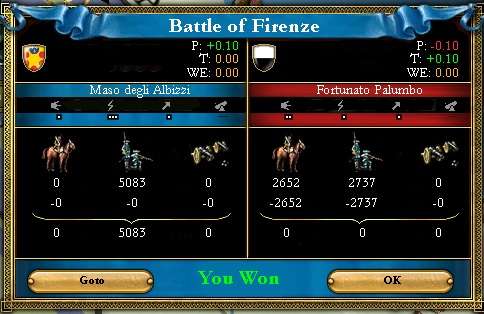
The remaining guards of Tuscany, initially very cautious when new troops entered the city, threw open the gates when the Emperor himself, on a gallant and shimmering white horse captured from a Sienese knight, called "Open the damned door! I am tired and must rest!" Despite the odds, near bankruptcy, and a populace in danger of revolting, Tuscany had won, doubling the size of her Empire.
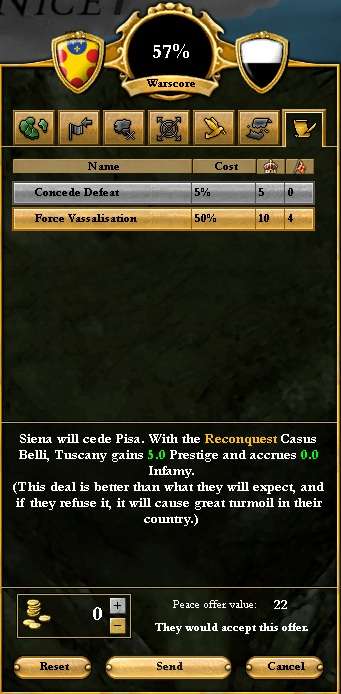
The Emperor took Captain Senex aside, thanked him for his loyal service, embraced him, and handed him personally the final payment for his company of mercenaries. Captain Senex, although nobody knew where he had been born, was proclaimed an honorary citizen of the Tuscan Empire and the first recipient of the Order of the Tuscan Empire.
Some say the party lasted for two days; others say two weeks. However, there was still an Empire to run.
-----------------------------------------------------------------------------------------------
22 August 1407, the Imperial Throne Room
When Cato walked into the throne room to give his daily report, he was bothered, but sadly not surprised, to see the Emperor already there.
"Did you sleep last night, Your Imperial Majesty?"
The Emperor, with enormous bags under his eyes, shook his head slightly. Then, summoning some hidden strength, cracked a smile, and asked, "How is my son taking to the young Lieutenant's teachings?"
Cato grinned with pride. "My son is surprised with how quickly he learns! Young Leopoldo can already read simple texts in Italian and Latin, and I have heard from some of the staff that he may soon start French. He cannot quite lift a practice sword, but I have seen the young master wielding a spoon with tremendous skill! You have a fine young heir, my Emperor." Although some of Cato's praise was exaggerated, as was to be expected, Leopoldo was certainly an exceptional youth.
The Emperor's smile got a little bigger, then slowly faded. "To business, my oldest friend. What news of Pisa and Siena?"
Cato nodded, and handed a report to the Emperor. "We have moved our national focus to Pisa; by openly proclaiming it second, to only our capital, we have greatly improved our economy as well as other aspects of society. We may also get legitimate cause for war from neighbors that are jealous of our success!"
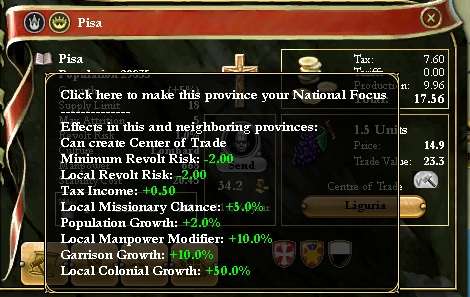
"In foreign news, there is one event of note: Siena signed a peace with Burgundy. They bribed the Burgundian general -- a mere 7 ducats bought them peace. I trust your Emperor will soon want to take the rest of Siena?"
The Emperor almost imperceptibly shook his head. "No, my Consul. We signed a truce of five years and we shall honor that truce. Too many lives have already been lost. Is that all?"
Cato nodded, and the Emperor, wincing as he did so, shook Cato's hand and sent him home.
As he walked out of the Imperial chamber, Cato shed a few tears over the Emperor's state. He hoped all the Emperor needed was some rest. He made a mental note to send for another doctor -- there was an Arab who considered quite good.
---------------------------------------------------------------------------------------------
1, November 1407, the Imperial Throne Room
Cato had sent away another doctor; an Asian holy man had proven to be another charlatan. He was shaking his head as he entered the Throne Room. He had to blink three times, then rub his eyes, at the sight he saw before him. The Emperor of Tuscany playing with his son on an imported rug! The Emperor almost looked like a new man; only a very old friend, like Cato, could see that part of this was just acting for the four year old Leopoldo; but part of it wasn't.
"Ah, Cato! Please come and join us!"
With a wry smile, Cato declined. "No thank you, Your Imperial Majesty. My bones are too old to engage in such games. I must say, you look to be in good spirits!"
The Emperor's huge grin lit up the room, "You know, Cato, I feel as if I've lost twenty years in one night! Have we business today?"
Cato shook his head, still in disbelief over the Emperor's transformation. "No, my Emperor. Things have been quiet. Our economy is slowly recovering -- I have no doubt we will pay the loans off before long. That German banker you hired while still in the field -- Albrecht Meyer, right? -- has helped us negotiate with our creditors to lower interest rates by 2%. When he and the Swede, Axel, get together, you can hear them chattering and scratching for hours! Sheriff Butteri is equally adept at his job; even without the war taxes, the money we saved by dismissing the mercenaries, plus his fine work, has helped us tremendously."
The Emperor, pleased, said, "I am glad we have such fine advisers. Speaking of mercenaries, can we raise more troops yet? We cannot rest on our laurels, Cato. Other lands beg for the Empire's touch!"
Cato handed the Emperor a report.
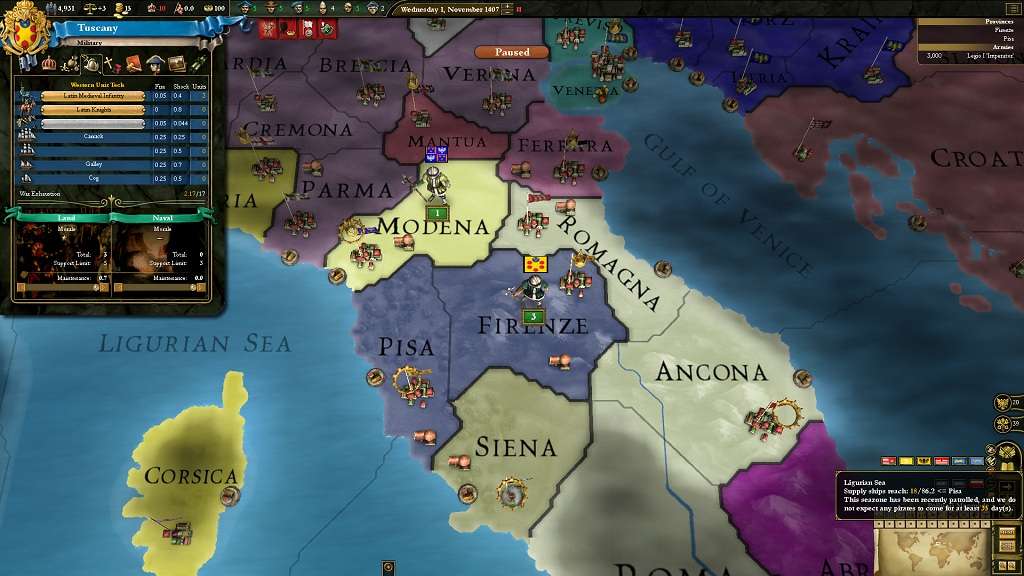
"My Emperor, we could raise another two regiments, and with access to the sea now, our shipwrights are confident we could construct a fleet of three ships."
"That is wonderful, my dear friend! I am glad the Empire is in such capable hands. Now, I have a more serious question for you. Would you join me for dinner this evening? We have personal business to discuss."
"Of course, Emperor! I would be delighted to."
"Fantastic, Cato. It shall be a private dinner, just the two of us."
-----------------------------------------------------------------------------------------------
Later that night, after dinner
"My Emperor, I dare say your chef has outdone himself. I have never eaten better."
"Nor I, Cato. Nor I. Now that you are satisfied, I trust?" -- Cato, loosening his belt, nodded wistfully -- "We shall speak of business. My recent ill health has led me to give a lot of thought to how things will proceed, should my son still be young when I pass on to my reward."
Cato objected vigorously, "But my Emperor! You are the picture of health!"
Smiling, the Emperor dismissed Cato's response with a wave of his hand. "Yes, yes, you are too kind. In any event, should the unforeseen occur, I would like you to serve as the primary Regent for my son, until he reaches his majority."
Cato was thunderstruck. "If that is your will, Your Imperial Majesty, I will obey, of course, but surely others are more qualified?"
The Emperor chuckled. "Perhaps so, but the only person I trust to relinquish power after my son is ready is you. You may choose whomever you like to assist you; you will not have the imperium, and cannot declare war, but you may, of course defend our kingdom, and if you take a few lands in the process, who is to argue?" Maso I winked mischievously.
Cato couldn't help a quick chuckle himself. "I humbly accept."
Maso I clapped him on the shoulder. "Excellent! I believe I shall retire for the evening; a safe journey home, Consul."
"Thank you, Emperor. A fine night's rest to you."
What Cato did not know, indeed nobody knew, was that those would be the last words anyone ever spoke to Maso I. Two hours after Cato had left, he was immediately summoned back to the palace. Dozens of people were weeping, including the Empress. When he went to her to ask what was the matter, it only prompted fresh tears. The only person able to contain themselves for long enough to explain was his son.
Cato the Younger said to Cato the Elder, "Father, the Emperor is dead. We found an official Imperial decree designating you as the Regent for Master Leopoldo; the ink was not even dry when one of the chambermaids discovered the... the..." The Lieutenant could not choke back his tears any longer. His father understood, and fighting back tears of his own, asked one final question.
"Why did he seem so happy? He was full of energy and youth when I spoke to him after dinner."
The son's face darkened, and whispered in his father's ear, as he still shook with tears, "Opium. The Chinese doctor you chased away gave him some; the Emperor, pious man that he was, must not have known it was forbidden by God himself."
Now the Consul understood why the Emperor was so happy, and the absence of pain had nothing to do with it. Bitterly choking back fresh tears, "No, my son. The Emperor was not pious. He knew exactly what he was taking. The Emperor purposefully took his own life so he could finally rest. Nobody was wearier than the Emperor, my young son. The men he killed and saw die in battle just weighed too heavily on him. Unlike you, he was not raised to be a soldier, but forced to be one by the weight of circumstances. That is why he always wanted his son to be trained and serve in the military, so maybe Leopoldo could do what his father could not." As Cato the Elder turned towards the funeral party, he stopped a moment and turned back. "Did you discover the drug in his room?"
"Yes, Father."
"Tell no one. He may not have been pious, but many of our people are, and I do not want his memory or his grave desecrated."
"Of course, Father."
"And Heaven help you if you ever tell his son."
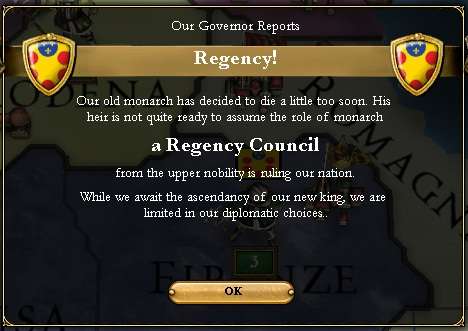
------------------------------------------------------------------------------------------------
Game play notes:
[1] Fortunato had 2 fire pips. I know PI added fire into pre-gunpowder battles to make battles more decisive, and this was the best RP explanation I could come up with.
[2] This is on me -- for somebody who most recently did a Russia AAR, you'd think I'd remember to scorch land you don't plan on holding.
[3] I know that technically corporal wasn't used in the Roman Empire or Republic, but I'm going to use it (and other modern military ranks) instead of more obscure Latin ones to make it accessible to everybody. Plus, looking up those ranks and figuring out the right equivalents is a huge pain and I don't feel like doing it
[4] Or, to translate, the idiot player bought a cavalry regiment by mistake, cancelled it, but didn't get any money back because, well, you don't in EU 3.
[5] A Latin pun here; instead of calling him Maso, his name, he calls him M-asino.
Asino is the ablative singular form of Asinus -- I don't have to draw you a map, do I?
These updates are exhausting, but fun to write -- I have to do game play for both AARs, so probably no updates until this weekend for this AAR. Syni Kyiva is due next -- I need to play two more years to finish an update for that one.
Yay, Tuscany grows stronger! Siena had it coming.
Too bad the king died. Now you have to wait for your epic heir to grow up so you can finish annexing Siena.
Too bad the king died. Now you have to wait for your epic heir to grow up so you can finish annexing Siena.
Yay, Tuscany grows stronger! Siena had it coming.
Too bad the king died. Now you have to wait for your epic heir to grow up so you can finish annexing Siena.
I was worried he'd die during an assault -- so he waits and dies after the war
So Tuscany grows...
I have to admit I laughed at the evil man who bought horses
I was concerned this update was a bit too maudlin, so I tried to mix in a little humor time and again; glad to see at least one reader thinks I succeeded.
After I finished yesterday, for fun, I pasted this most recent update into word -- apparently, it would be 22 pages were I to print it, and over 6,000 words!
So people are not surprised, I am going to reserve the right to occasionally edit the save game, but only to change the names of Rulers (and occasionally, Generals). You have been warned
Keep up the good work with the Tuscan empire. Too bad about Maso, he was too young to die!
Dang, 6000 words, mine are only about 1000, im impressed.
And yet, it's hard for me to be motivated enough to work more on my dissertation. If only dissertation research were as fun as EU 3...
Keep up the good work with the Tuscan empire. Too bad about Maso, he was too young to die!
Will do! It sure would help if I had some allies, but everybody allied up in Italy, leaving Tuscany without a dance partner. My biggest fear is Milan -- in every test game I either got vassalized by them, annexed by them, or (once) I annexed Milan. I'm going to use the regency to prepare as much as possible for another war; finishing off Siena, then going after the Pope, Naples, and possibly Sicily are all on the docket. Once I've unified Southern Italy, I should be in good shape to resist Milan (or invade them).
Haven't had a lot of time to play -- working on other projects, plus my Vicky 2 AAR; I will do my best to get the regency into one update, since personally I find them boring
That was very good! Even though you changed styles from gameplay to narrative, you kept it smooth and eminently readable.
Well you got Siena and to the sea, now you'll have to see how the hood shakes out
Indeed -- not entirely sure what you mean, though
That was very good! Even though you changed styles from gameplay to narrative, you kept it smooth and eminently readable.
Thank you! I'm glad you're enjoying it so far; now we have the ultimate challenge -- making a Regency Council interesting.
I'll begin the next update shortly!
Indeed -- not entirely sure what you mean, though
Chapter 3: The Great Regency
1 November 1407, the Imperial Council chambers
Marcus Porcius Cato Maior, Regent of the Empire of Tuscany, looked through his glasses at the group surrounding the table. Although there were many talented administrators and diplomats, military leadership simply did not exist. Although Cato's own son, Marcus Porcius Cato Minor, had been a Lieutenant in the Legio I 'Imperator' shortly before the Emperor's death, that was largely a ceremonial title. Cato the Younger's primary duties were to tutor the Heir to the Empire, Leopoldo. Although a five year old lad, Leopoldo already showed tremendous promise, and all around the Empire looked forward to Leopoldo reaching the age of majority and leading the Empire, as his father had done. Cato the Elder had even tried contacting Captain "Senex," the mercenary hero of the War of Restoration against Siena, but he was already on campaign, fighting against the Ottoman Turks. Cato said a silent prayer, then addressed the rest of the Regency Council.
"A fine morning to you all. For those who do not know me, I am the Regent to Leopoldo I, Cato. I was former Imperial Consul and a very close friend to our beloved Emperor Maso I. My son is the personal tutor and bodyguard to our future Emperor. I hope this establishes my bona fides to all who are present.
"As I do not lawfully have the right of imperium -- specifically, the right to declare war -- I plan to use this time to prepare our Empire to deal with any potential threat that might oppose our future Emperor. We shall work on establishing a strong economy and developing new technologies.
"To this end, beginning 1 January 1408, we shall meet every six months to discuss matters of importance to the Empire. I will be available at any time, day or night, if something urgent arises, but I expect most of this Regency to go smoothly.
"We will have three key ministries. The Foreign Ministry will be headed by Marcus Tullius Cicero. Although unfamiliar to many of you, he was Marcus Vipsanius Agrippa's chief deputy when he was Imperial Chancellor. Before that, he was a skilled orator; indeed, his skill as an orator drove him to select the name he did.
"The Economic Minister will be the Swede Axel Gathenhielm, former Master of the Mint. Although a foreigner, and thus not required to take a Roman name for high office, he was one of the first advisers that our departed Emperor hired and has served Tuscany faithfully and loyally for many years now.
"Our Minister of the Interior will be our Sheriff, Salvestro Butterius. Rather than create a new Roman name, he prefers to be addressed by a Latinized version of his Italian name. Many of you know him personally, some, perhaps, a little too well" -- there were quite a few laughs at this remark, the first laugh for some since the Emperor had died -- "and we are very happy to have him."
Cato took a deep breath. He knew his next decision would be extremely controversial, and if he did not convince everybody at the table, it could be ruinous both for the Empire and him, personally.
"In addition to our ministers and all of you" -- gesturing those seated around the table -- "we will have two additional guests at every meeting of the Regency Council. First, my son, who will serve as de facto commander of the First Legion should hostilities break out; for now, he will serve in a purely administrative role. I do not have the authority to promote him, so you may continue to refer to him as 'Lieutenant,' but he is the chief representative of the military and should be treated with due respect. This may seem like nepotism; I assure you, it is not. For, you see, he will be serving another purpose at the table, that is, guardian to our second guest -- Leopoldo I."
At this last remark, nearly two dozen voices all tried to speak at once, many shouting. Cries of "he's too young!" and "This is just an excuse to give your son a spot in the council" rang out. The Dowager Empress, surprisingly, stood and spoke up.
"My friends, you dishonor the memory of my husband to make such unfounded accusations. The Regent consulted with me before making this decision, although he did not have to -- I have no wish to interfere in the business of policy. As the boy's mother, I feel it is important that he be given exposure to the debates that concern his future Empire. He may even have some valuable insights to contribute as he grows older. Please respect my wishes as you would those of our fallen Emperor, Maso I.
By invoking the name of her husband, the Dowager Empress knew there would be no further objections. Cato nodded to her, gratefully, then dismissed everybody. He wondered how the first meeting would go; he had two months to go.
------------------------------------------------------------------------------------------------
1 January, 1408
Cato called the meeting to order; he knew there would not be much business in only two months, but he wanted to establish certain protocols and traditions, and with few matters to address, it would be easier to do so now.
"Fellow members of the Council, I bid you welcome. We will begin with a report from our Economics Minister. Minister Gathenhielm, what have you to say?"
The Swedish economist gave a very brief report. He pointed out that much debt had been incurred during the recent war, so he was continuing to divert all revenues towards building up the treasury to ensure that the debt would be paid off. This meant some short term discomfort, but it was critical to give the young Emperor a fiscally solvent Empire when he was ready to rule. He then bowed to Cato and sat down.
"Thank you, Minister. Our next speaker will be our Foreign Minister. Minister Cicero?"
Cicero rose from his seat. Easily the youngest man at the table -- he had only recently turned 23 -- he was also the most confident. "Regent Cato, Members of the Council, I recognize that we do not possess the imperium to declare wars on our own. Instead, I sent a warning to Siena and the Papal States; this way, if they attempt to expand at our expense (or the expense of any other power which neighbors us), we will have a legitimate pretext to engage them. We are not obligated to do so, but I do believe we must maintain maximum flexibility."
There were murmurs from all around the table; this youngster had the political and diplomatic savvy of one many times his age! He was truly worthy of the name Cicero. Cato, too, was pleasantly surprised -- although he had come highly recommended by most of the ambassadors, he was still a bit skeptical of anyone so young; he would never be skeptical again.
"Thank you very much for an insightful report and shrewd decisions! The Minister of the Interior has already informed me he has nothing to report; he has a sick child at home, so I did not require him to come today. Having two young daughters of my own, Lucia and Publia, I understand that when your loved one is sick, you must attend to them, as I am sure many of you will agree. Therefore, our final speaker will be my son, who will report on the Emperor's education and progress. Marcus?"
Cato the Younger saluted his father, as befit his station in the military, then picked up a parchment and began to read. Many present took their first look at the young Lieutenant; about three inches taller than his father at 6'1", he was 34 and had several scars on his arms. Unlike his father, he affected a bushy black beard, perhaps to distract the viewer from his nearly completely bald head. He was the only person at the table who was armed; as the chief bodyguard to the Emperor, nobody begrudged him this right.
"Thank you, Father. Fellow citizens of the Empire, our Emperor continues to grow; he will be a very tall man someday, at least my height if not taller. He has taken to writing letters to friends and family to practice his Latin; already he is very good, perhaps not as good as our Cicero" -- there were plenty of polite chuckles, and a humble bow from the man in question -- "but certainly better than me. To fit in with other monarchs, he is also learning French; his tutor is incredibly talented, and young Leo has taken quite a shine to her." Many had already begun calling Leopoldo "Leo." The Emperor-to-be had tremendous difficult with the letter "P" as a child, often pronouncing it as a "B," so the nickname stuck. Granted, very few people could use it in public, but Cato the Younger was assuredly one of them.
"Other than that, I have nothing new to report. I inspected the army in their winter quarters three weeks ago; many are bored and wish for something to do, but they continue to train. Regent?"
Regent Cato the Elder thanked his son and dismissed those present. That had gone rather well, but then again, there was not much to discuss. What would happen if things got more controversial?
------------------------------------------------------------------------------------------------
1 July 1408, 1st Session of the Regency Council
Cicero was pacing; he'd received important news and wanted to share it immediately, but the Regent insisted on following protocol. As the junior minister, he would have to respect his station and allow Minister Ganthelhielm and Minister Butterius to speak first. Neither had much to say: the Economics Minister had nothing at all to report and all Butterius had done was send two magistrates to Pisa to convince some unhappy Pisans that Tuscany was the ruler of Pisa now; any thought of reviving old and useless claims would be pointless and counterproductive. It seemed the two magistrates were effective, and some rumored riots never materialized.
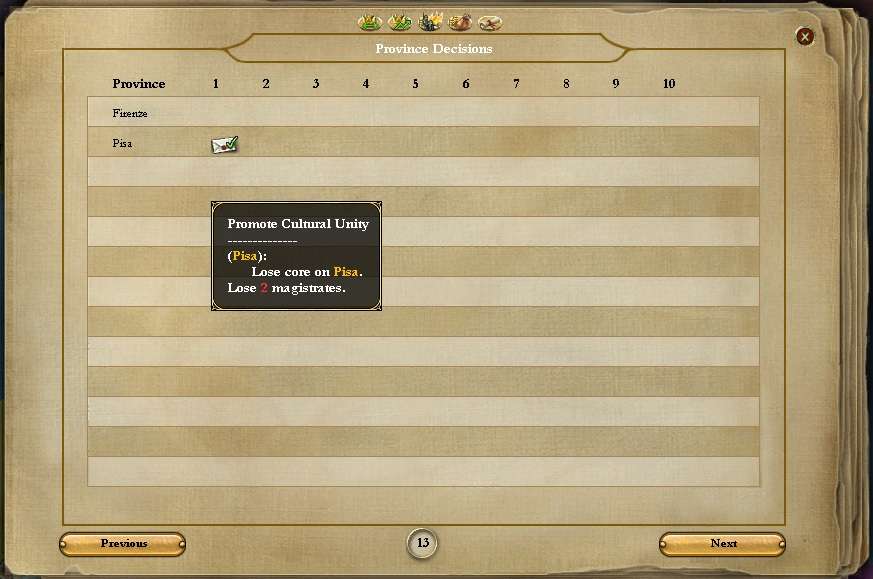
Finally, the impatient Cicero was granted the right to speak, and his news was indeed shocking. "Fellow council members, Siena, our eternal enemy, has been excommunicated by the Pope! This is an opportunity not to be missed! We should prepare a formal declaration of war at once and --"
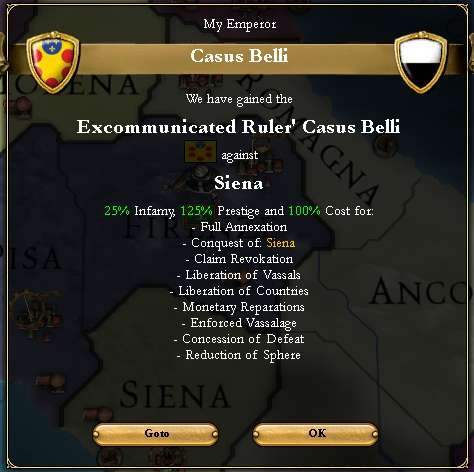
Before Cicero could speak further, Cato interrupted him. "Minister, you forget yourself! Declarations of war cannot be undertaken by a Regent; only the Emperor himself has imperium. We may be enlightened and superior to the rest of Europe, but we still must act civilly within the international community, which is why we still use the old titles of nobility even though, as we all know, all Tuscan citizens are equal. I will not correct you again, Marcus Tullius."
Cicero blushed a bright crimson and begged forgiveness from the Regent. Although he knew he was right, defying Cato would have dire consequences, and Cicero was too ambitious to throw away his newly acquired power and authority over a trifle like Siena. Cato the Younger finished the day's activities by reporting on two new regiments of infantry that had been raised from Pisa, bringing the total numbers of the First Legion to 5000. Before the Regent could leave, Cicero pulled him aside.
"Regent Cato, I wanted to apologize again for my impetuousness. It turns out you were wise to stop me; I just received this letter from an ambassador to Genoa, who informs me that Genoa has beaten us to it. A setback, but one we could correct in the future. However, that is not why I wished to speak with you privately. You mentioned the nobility; I've received some interest in further royal marriages, but obviously our Emperor is too young to be betrothed. How should we address this?"
Cato considered this for a moment. Admittedly, the intricacies of diplomatic exchange were somewhat lost on him, but he knew that additional royal marriages would increase Tuscan prestige throughout the world. His solution was simple. "Cicero, thank you for bringing this to my attention -- I had not thought of this. I will send a proclamation of the Council to be distributed later today; all patents of nobility from before the Empire will be honored. In addition, all current council members will immediately receive the rank of Count in addition to any others they might current enjoy. Of course, this includes the two of us, Count Cicero." Both men smiled at one another; any references to public equality were merely for peasant consumption, after all. Behind closed doors, status meant a great deal more to the lords and ladies of Tuscany than idealistic slogans and mottoes. Of course, patents of nobility were worthless without a comfortable salary and the right to pass the title down to one's children.
------------------------------------------------------------------------------------------------
1 January 1409, 2nd Session of the Regency Council
The new year usually meant new challenges for the people of Tuscany; 1409 began with some radical changes to the landscape of Italy.
Cato, as always, first indicated that the Economic Minister could be speak, half expecting the Swede to give his usual non-committal answer and sit back down. This time, though, there was a little news to report.
"Counts and Countesses of the Council" -- everybody grinned at one another at this opening, elbowing and nudging each other -- "I have begun sending our most skilled merchants to Liguria in Genoa -- this Center of Trade could be very lucrative for us, and there is no reason not to take advantage of our Compact with the Genoese. This should generate additional monthly income for the Empire."
The Council agreed this made good sense; in fact, some wondered why they had not sent merchants before -- when one member of the Council explicitly asked, the Minister pointed out the state of war that had recently befallen the kingdom. To protect Tuscan merchants, it was important to keep them in Tuscany until the war was resolved. The Minister of the Interior had little to say, merely reporting that law and order ruled throughout the Empire.
As usual, the most talkative member of the Council was Cicero. He had much to report; Genoa had annexed Siena, prompting a warning from the Tuscan ambassador not to expand further. Prominent Tuscan nobles agreed to marriages with nobles from Austria, Milan, and Hungary; a similar request posed to Ferrara was met with a polite refusal. In November, Sicily had declared war on Algiers; this bore mentioning, since Tuscany too had some designs on North Africa. Although they could not do much about it now, it was important to take note of such matters. Cicero then sat down.
-------------------------------------------------------------------------------------------------
1 July 1409, 3rd Session of the Regency Council
Cato was impressed with how quickly business was conducted at this session; a slight redistribution of revenues would ease the rising inflation in the Empire, now up to 2.4%. These new revenues would go into developing a more powerful military. The only foreign news worth mentioning was Savoy's declaration of war on Sardinia.
--------------------------------------------------------------------------------------------------
24 July 1409, Emergency Session of the Regency Council
Sheriff and Minister of the Interior Salvestro Butterius wiped beads of sweat from his forehead. He had asked Regent Cato to call this meeting mere weeks after the last session because he had dire news.
"Members of the Council, we have a pretender to Leopoldo I's throne! The recent decision to Centralize power in the hands of the people in this room has backfired; Cosimo Tempesta raised five regiments to press his claim. Lieutenant Count Cato has ordered the First Legion out of quarters and into the field; they have explicit orders to chase down and eliminate this rebellion."
Everybody was momentary stunned; although few if any people present owned much land, a Pretender to the Throne was bad news; if the Pretender took power, they would all be dismissed and quite possibly executed. There was little they could do, though, but hope that the Legio I 'Imperator' would continue to protect and defend the Empire.
------------------------------------------------------------------------------------------------
1 July 1410, 4th Session of the Regency Council
Although he had been a little apprehensive about cancelling it, Cato the Elder knew he could not expect much attendance at the 1 January 1410 session of the council with the Pretender and his armies still marching through the countryside. Fortunately, the brave soldiers of the First Legion finally captured and executed Cosimo Tempesta on 30 April 1410. Some privately questioned the Lieutenant's decision to stay in Florence instead of going out to the field; however, these few reconsidered when they remembered that Cato the Younger was not really a field commander, but the Emperor's bodyguard and teacher in military affairs.
As it turned out, after the apprehension of the Pretender, not much happened in Tuscany. Cicero reported that Sicily had expanded considerably with the end of their war against the Algerians, claiming the province of Constantine. Other than that, things were quiet. The new Centralization helped increase the efficiency of tax collectors, and more ducats were rolling into the Imperial coffers.
------------------------------------------------------------------------------------------------
1 January 1411, 5th Session of the Regency Council
As the only man with much to say in these sessions, Count Marcus Tullius Cicero, Minister of Foreign Affairs, grew in stature with each new session. He'd already earned the right to speak first at the Council sessions, after the Regent. Many joked that the other two ministers had in fact retired the year before; neither one was even present this year, as Minister Ganthelhielm had returned home to Sweden to take care of some personal affairs and Minister Butterius was still rooting out the final remnants of the Conspiracy of the Pretender.
Mere moments after being introduced by the Regent, Cicero reported the end of war between Savoy and Sardinia; a white peace was signed, as Sardinia had called upon some powerful allies for assistance, including Naples. The leaders of Burgundy, Lorraine, and Baden all cemented relationships with Tuscan nobles, while France and Savoy politely declined. Milan still showed little interest in signing an alliance with Tuscany; although relations were very high, Milan simply did not consider Tuscany a worthy power. This irked the entire Regency Council, but nothing could be done; perhaps pursuing this alliance was a mistake? Still, they had to keep trying, at least until they could think of another way to secure Tuscan independence.
-----------------------------------------------------------------------------------------------
1 July 1411, 6th Session of the Regency Council
Cato had no idea how important 1411 would be before he arrived at the Imperial Palace that day in July; Cicero was already waiting, as was the rest of the Council, including Cato's son and the now 9 year old Emperor-to-be. Cato apologized profusely for being late; Lucia had been very ill the night before and he was up all night comforting her.
Cicero immediately provided some interesting news. France, at war with Sardinia, had annexed the small island nation, worrying many of those present who had family there. Still, Naples fought France to a draw, although not without losing many soldiers. This had a direct effect on Tuscan affairs; they had offered a military alliance to the Empire! The Regent signed the alliance on behalf of Leopold I; a powerful neighbor could provide protection in the event of expansionary desires by the rest of Europe! Days later, Savoy guaranteed Tuscan independence.
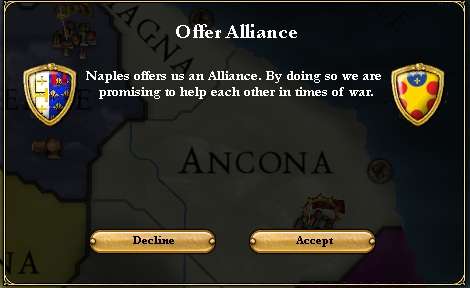
The formal request from the Neapolitan ambassador
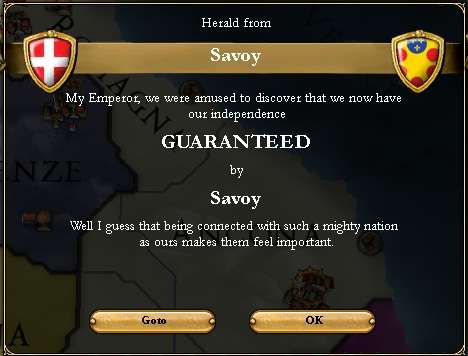
Savoy's official guarantee
Minister Ganthelhielm also had something to report. Another successful mission by two magistrates had suppressed another potential revolt in Pisa by the Sienese minority by promoting cultural unity; as Lombards, they should be brothers, no matter how the borders were drawn.
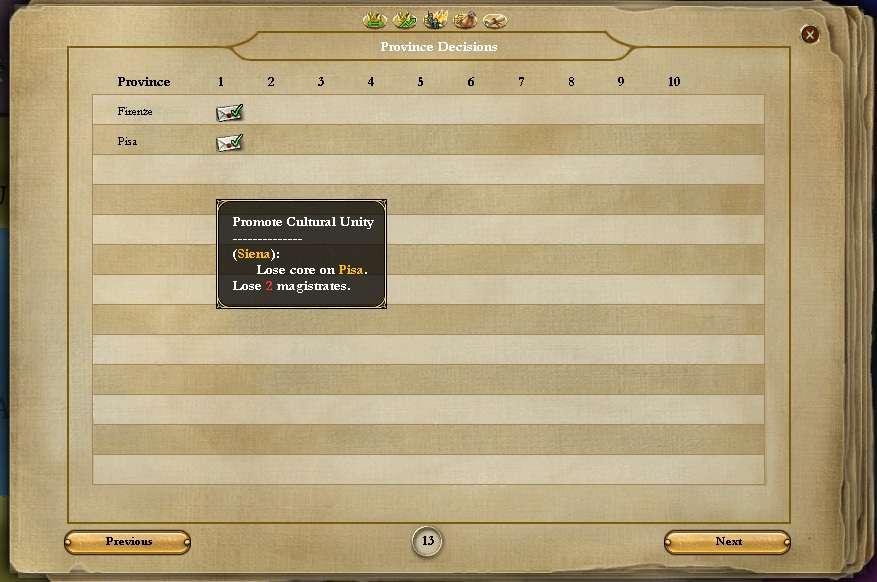
The Minister of the Interior and Lieutenant Cato had nothing new to report; Regent Cato, on the other hand, had the sad news of informing everybody that the German banker, Albrecht Meyer, had died in his sleep. He'd been sick for quite some time; everybody realized how lucky they were, since he was the youngest of the advisers formerly appointed by Emperor Maso I. The Regent hired a well known Philosopher, Raniero Ulivelli. By appointing him as a Court Philosopher, other nations began to take notice of Tuscan universities; they received an increase to prestige as a result. The vivacious young Ulivelli was not appointed to the Council, but given a sinecure and allowed to do as he wished. Personally, the Regent found him irritating, so it was doubly convenient to have him away from Florence.
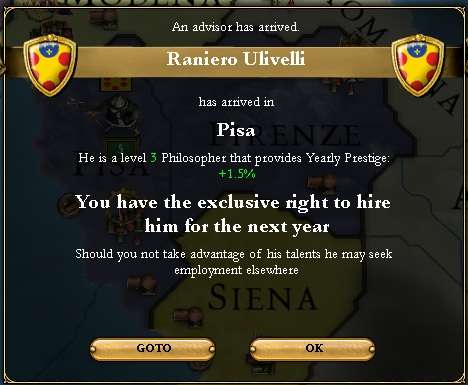
That concluded the busy session of the Council. With Leopoldo's 10th birthday coming up, the 1 January 1412 session of the Council was to be cancelled to plan the celebration.
------------------------------------------------------------------------------------------------
1 July 1412, 7th Session of the Regency Council
The birthday festivities for Leo I (as he had officially requested to be known) had been a tremendous hit, and quite the social event for Europeans everywhere. Even the King of far away England had stopped by, a mark of Tuscany's growing importance. To toughen the young Emperor up, Count-Commander Cato the Younger (Leo I had insisted that his mentor was long overdue for a promotion, and in recognition of his wishes, the Regent had officially promoted his son) was out at the First Legion's camp with Leo I; Leo was to spend the next year there, honing the military art, learning basic strategy, and learning the basics of legionary life. The new Commander had to be present, both as his instructor and his bodyguard.
For once, Cicero had nothing to say; he'd been on sabbatical in France with his new wife, the daughter of the Duke of Orleans. Although he'd arranged many a political marriage, this marriage was for love; they had met at a diplomatic reception in Paris. He had happily renounced any and all claims to the Duchy of Orleans; he loved his home and had no desire to live anywhere else, which would be required if he became Duke.
The Economics Minister was first to speak. He reported that he had used the Imperial Treasury to pay off two of the loans, but did not have the cash to pay the other three; he reduced spending on science to compensate and increase the Imperial coffers.
The Interior Minister mentioned a new breakthrough in technology: called a Constable, constructing them could increase direct tax rates by 25% in the province it was built! Cato was particularly interested in the new invention; he promised to allocate funds to build them as soon as the loans were paid off.
-------------------------------------------------------------------------------------------------
1 January 1413, 8th session of the Regency Council
Cicero had returned from his honeymoon, and everyone agreed that marriage suited him very well -- he was a little less bombastic, which made everybody relieved. The Countess Cicero was at his home in Florence; she found politics boring and preferred reading at home. The running joke was that Cicero married her because she was the only woman in the French speaking lands who could read and understand his speeches; although an exaggeration, this was not as much of one as one might think.
He had several marriages to report: Brandenburg, Holland, and Gelre all made arrangements with prominent Tuscan noble families. In fact, the Regent's son was a recipient of one of these marriages; he had been a life long bachelor, but he was the only son of a prominent Tuscan family. The third daughter of the Elector of Brandenburg was the widow of a soldier, and many believed that was why Commander Cato and his new wife got along so well; others speculated it was because they had no idea what the other was saying, since the Elector's daughter -- Wilhelmina -- only spoke German. In any case, they were amicable enough, and by this point, she was with child.
Nobody else had anything to mention; the Regent closed the meeting by informing his son that he had requisitioned some military-age youths to make improvements to the Imperial Palace; with such a small army, many such young men were not being gainfully employed.
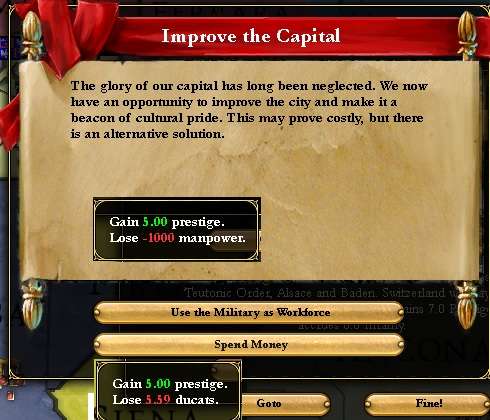
What else were these young lads going to do?
-------------------------------------------------------------------------------------------------
1 July 1413, 9th Session of the Regency Council
This was a short meeting, as another attempt to Centralize tax collection had resulted in another Pretender to the Throne. Unfortunately for Domiano Compagnoni, the future Emperor was still in the field; he insisted on getting involved in combat himself, and this experience would prove very useful for the soon-to-be Leo I. Although the rebellion still raged, all were confident that it was only a few short weeks until this Pretender, like the last, was arrested and punished for treason.
--------------------------------------------------------------------------------------------------
1 July 1414, 10th Session of the Regency Council
The rebellion was long since over, but Count Cato, Regent of the Empire, had cancelled the last session of the Council to spend time with his new granddaughter; the Countess Wilhelmina had rarely let the child -- named Sextus by his father -- out of her sight. Apart from the end of the rebellion, the only significant event was the graduation of the class of 1413 from the University of Pisa -- a brilliant bunch, they improved Tuscan culture immeasurably.
Cicero ticked off some more royal marriages: England, France, Brittany, Bavaria, and Bohemia all provided young nobles to be married to Tuscan elites. The now 12 year old Leo showed no interest in any of the girls. Rumor had it that he was very attached to a girl in Tuscany, but nobody knew who she was. In any case, the future Emperor insisted that no royal daughters were to be brought to his quarters.
Minister Butterius announced the construction of the first Constable, to be built in Florence. He also noted that some researchers at the University of Florence had learned more about how to govern effectively; they had made another breakthrough, although a purely theoretical one.
In something of a surprise, Leo I addressed the Council for the first time; his voice had just begun to break, but nobody dared tease the Emperor-to-be.
"My friends" -- he had unconsciously adopted this from his father; some people actually squirmed a bit in their chairs at the word 'friends' -- "I want to thank you all for taking such good care of my Empire. You can rest assured, I shall not forget all of the hard work each and every one of you has put into all aspects of Tuscan society. I only hope I can live up to your expectations and build upon the Empire my father left me when I was but a child. Glory to the Tuscan people! Glory to the Empire!"
The thunderous applause was entirely genuine; surreptitiously, Leo grinned at Cicero, who had written the speech for him; Leo's own ideas were about conquest and battle, which he hungered for.
Cato bowed deeply to the new Emperor and thanked him for his kind words, he dismissed the session, privately proud of what Leo had become. He would be a great Emperor!
-------------------------------------------------------------------------------------------------
1 January 1415, 11th Session of the Regency Council
The Regent addressed the Council directly; there was no need for ministerial reports, as the only major foreign policy development was a White Peace between France and Sicily. Cato himself had taken the initiative to begin construction on the Pisan Constable; he had also gotten word from the University in Pisa that a breakthrough in Trade Technology enabled the construction of Marketplaces, which increased the province's trade income by 10%.
Cato spent the rest of the evening at dinner with his two daughters; he didn't have much time to spend with Publia or Lucia, and it had been far too long since he'd seen either for more than a few minutes. Publia bubbled about her new fiancee; Cato didn't like him very much, since he was a mere farmer, but Publia seemed to love him, so he gave his blessing. Lucia was oddly quiet; he wouldn't find out why until months later.
--------------------------------------------------------------------------------------------------
1 July 1415, 12th Session of the Regency Council
It seemed to be a normal session of the Regency Council -- Cicero added marriages to Pommerania, Denmark, and Poland to his list, while the other ministers had nothing to add. It was normal, that is, until the Emperor rose just as Cato was ending the session.
"Pardon me, Uncle Marcus" -- at this Cato paused, since Leo had not called him anything but 'Count' or 'Regent' Cato since he was six years old -- "but I have an important announcement to make. I am sorry we had to keep this from you, of all people, but I knew if I let you, there would have been a large wedding celebration, and I wanted to have some privacy one last time before I became Emperor."
Cato blinked at the news, and was at first hurt, but then realized how true Leo's words were. Leo would not be the full master of his fate once he was crowned Emperor; he would always have to take the interests of his people and his Empire into account before his own. Cato nodded, and motioned for the future Emperor to continue.
"Thank you for your understanding, Uncle. I wanted to love the person I was to marry; I know this is somewhat unusual for other future monarchs, but fortunately, I did not have to look very hard or very long." The room was deathly quiet at this point -- everybody wanted to know who the Emperor had chosen. Was it the English princess that had visited two weeks before? Maybe the exotic Portuguese duchess? Some quiet but fervent speculation continued, while the door to the hallway silently opened and closed, and the new Empress-to-be approached her husband. Everybody gasped, not least of all the Regent and the Commander of the First Legion.
"I now present my wife and your future Empress -- Lucia Porcia Cato!"
Nobody knew what to say. Some people had knowing looks on their faces; Cicero, in particular, mouthed congratulations. But the vast majority were completely stunned. Cato the Elder looked extremely angry, but he bit his tongue. It was the Emperor's prerogative to choose his wife, and alone of all the men in the Empire, he did not have to have the father's blessing. When he saw everybody else cheering and bursting into applause, he forced himself to join in. Leo noticed the look on Cato's face right away, looked perturbed, but motioned him over. Before he spoke to Cato, he dismissed the meeting personally; another first on this busy day!
"Uncle Marcus, I can see you're upset, and I suspect I know why. Lucia kept this from you, and so did I. It was not our intention to hurt you, and I know you are especially angry because I did not openly ask for your blessing. It is not because I do not respect or love you; you are as close to me as any other person I've ever met. This had to be kept quiet, however. Remember the fuss you made when Publia finally got married?"
Ruefully, Cato the Elder grinned and admitted he might have been distracted from his duties. With a smile of his own, Leo continued.
"The only person I told was Cicero, so he could politely deflect the marriage requests he kept receiving. Thinking of the Empire first, as he always has, he practically demanded I tell him something so he could quiet the rest of Europe down. Nobody else knew, not even my mother. Since I am taking something precious from you, I have something to give you in return. Please kneel."
Cato the Elder, a man in his late sixties, nonetheless got down on one knee, albeit with some difficulty. Leo I drew his sword -- the only heirloom he had from his father, apart from the crown that was not yet his -- and said, "As the future Emperor of Tuscany, I hereby knight you Sir Marcus Porcius Cato Maior, Duke of Pisa! You will continue as my Regent until I reach my majority, but after that point, you may retire to your new estates. It is, of course, a hereditary title, as are the lands. You may now rise, Duke Sir Cato."
The newly knighted Duke rose to his feet, a tear in his eye, and thought for a moment about how proud Maso I would have been of the man his son had become. Cato was not part of the old nobility; indeed, his father had been a lowly blacksmith. This new title immediately gave him status and cemented his position as second in the Empire, only to the Emperor. After this brief moment, he was swarmed by hordes of nobles, all of whom wanted to be the first to congratulate the new couple.
------------------------------------------------------------------------------------------------
1 January 1416, 13th Session of the Regency Council
For the first time, the Emperor-to-be did not attend the session, and neither did the Regent. The Dowager Empress had passed away after contracting a violent strain of the plague from a passing merchant ship that she visited as part of her ceremonial duties. The service was very short; everybody knew the body had to be burned as soon as possible.
Back at the Imperial Palace, Cicero read a note he had sent to Burgundy in congratulations for freeing Siena and Corsica from Genoa; although privately Cicero was irritated, since this meant that Burgundy would protect Siena and Corsica, he was publicly obliged to thank Burgundy. He then dismissed the session, after a brief moment of prayer for the late Dowager Empress.
-------------------------------------------------------------------------------------------------
1 July 1416, 14th Session of the Regency Council
Duke Sir Cato, Regent of the Empire, opened the session by reminding everybody to conserve the spices they had as best they could; the embargo by Genoa in January of that year meant that new spices were not likely to be forthcoming. Perhaps they had taken Cicero's note the wrong way; in any event, it was a small sacrifice that everybody needed to make.
Cicero's big news involved Brittany; Morocco had seized a portion of the French Atlantic Coast! Many thought that, with the defeat of Grenada, the Muslims were finally out of Western Europe; nobody expected a resurgence in Brittany, of all places.
Interior Minister Butterius showed everybody the plans for a new armory that the researchers at the University of Florence came up with; they could help arm new regiments much faster. He also reported that the Constable in Pisa began construction on 9 May, 1416.
With the Economics Minister staying silent, as usual, another productive session drew to a close.
------------------------------------------------------------------------------------------------
1 January 1417, 15th Session of the Regency Council
It was Cicero's session to run; since there were only two more sessions after this one before Leo would officially become Leo I, Emperor of Tuscany, nobody was particularly interested in formalities. Castille, Saxony, Ansbach, Sardinia, and the Palatinate all accepted closer ties via marriage; only Thuringia refused. France also reported a minor setback at the hands of Burgundy; an intriguing development, since both had a predilection to intervene in Italy. Everybody went home early; Leo I and Lucia had left on a trip throughout Europe to celebrate their honeymoon and would be back in a few months.
-------------------------------------------------------------------------------------------------
1 July 1417, 16th Session of the Regency Council
Sir Cato the Elder, Duke of Pisa and Regent of the Tuscan Empire, called the meeting to order. Everybody was still talking about the festivals and parades that celebrated the 1 year anniversary of the conquest of Pisa. Notes from all over the world were passed around by Cicero -- even far off Muscovy had congratulated Tuscany! That was all Cicero had accomplished; he had largely been responsible for planning most of the festivities.
Instead, Economics Minister Ganthelhielm had some good news -- the last of the war debts was paid off!
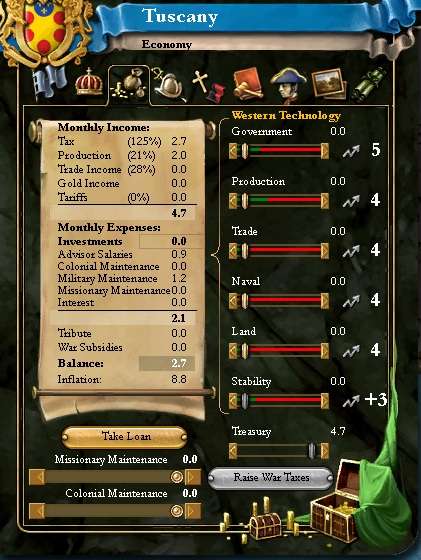
He now ordered all the revenues be poured into Army technology.
The Minister of the Interior Butterius complained about the amount of work he had done to recover from the comet that had been seen early in 1417; everybody laughed at the gullibility of peasants. Still, researchers managed to finish the plans for a dock that could substantially reduce ship building time.
In his closing remarks, everybody was concerned to hear a slight cough in Cato's voice. A bout of tuberculosis had been going around Tuscany, and Cato was not the young man he once was. Leo made every effort to hire the finest doctors, but the prognosis was not good.
-------------------------------------------------------------------------------------------------
1 January, 1418, 17th Session of the Regency Council
The final session of the Regency Council was presided over by Regent Cato, but not Sir Marcus Porcius Cato, Duke of Pisa, but his son, Marcus Porcius Cato, Duke of Pisa and Commander of the Legio I 'Imperator'. The elderly Duke had died, along with his wife and Wilhelmina, his son's wife, of tuberculosis. He'd been staying home while the two women took care of him; unfortunately, all three caught the disease and died shortly thereafter. Sextus, the Commander's son, had also caught the disease, but the Commander took his son out of the house before it got too bad. Sextus was still quite small, so the Commander hired a nanny to look after him while he was away in the field.
This final session was purely ceremonial; apart from marriages with Portugal, Aragon, and Naples, no ministers had anything to say, and the Emperor's 16th birthday was rapidly approaching.
--------------------------------------------------------------------------------------------------
15 February 1418, the Coronation of Emperor Leo I
15 February was doubly important for Leo I; it was also the birth of his son, Giuseppe (Lucia had insisted on a proper Italian name for the boy until he became Emperor) in addition to his coronation.
All the members of the Regency Council were rewarded with riches for their faithful service. Cicero was named Imperial Chancellor. Unlike his father's administration, Chancellor under Leo I was not just foreign affairs; it also included the older office of Imperial Consul. The other Imperial ministers kept their same duties; Leo I did not want to destabilize the government on a whim. The Empress was also part of Leo I's advisory council -- part of the reason they had fallen in love was because of her intellect, which she had doubtlessly inherited from her father. As far as her elder brother, he served as chief military adviser to the Emperor, but retired from active duty to take care of his son; he just did not feel right leaving his son in the hands of a nanny.
Nobody knew what was in store for the Empire of Tuscany under Leo I, but everybody agreed that the future looked bright, and perhaps the ancient dream of rebuilding the Roman Empire would come to fruition.
-------------------------------------------------------------------------------------------------
I've played a bit farther than this -- I've got enough material for the next update, so I might get that done in a day or two, although I need to go back to my Vicky 2 AAR too.
The next update should be very interesting, and that's all I'll say
By the time you finish this AAR, you'll have enough material to write a novel! At least you made a regency council seem interesting. 
By the time you finish this AAR, you'll have enough material to write a novel! At least you made a regency council seem interesting.
quote for truth

